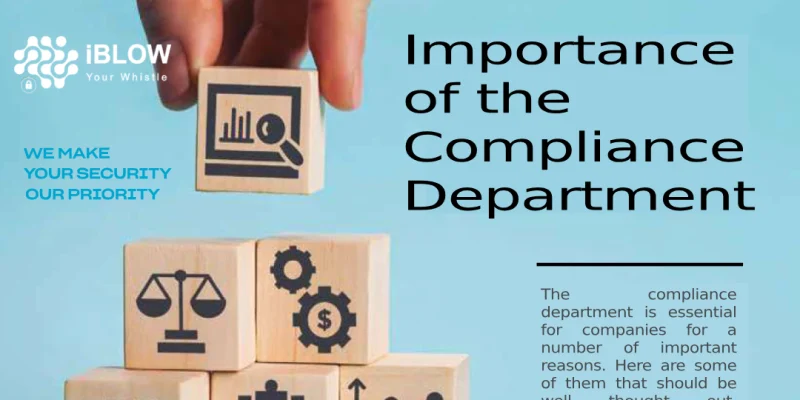The compliance department is essential for companies for a number of important reasons. Here are some of them that should be well thought out, internalized and the necessary actions taken to achieve them:
Legal compliance
The main objective of the compliance department is to ensure that the company complies with all laws, regulations and standards applicable to its industry and operations. A well-functioning compliance department helps to avoid fines, lawsuits and other legal problems that can result from non-compliance with the law.
Protecting Reputation
Failure to comply with laws and regulations can damage a company’s reputation. The trust of customers, investors and stakeholders can be shaken if a company is seen as unethical or unethical. An effective compliance department helps to preserve the company’s reputation and, by continuing to promote its good activity, to build a future of improving that reputation.
Risk management
The compliance department identifies, assesses and manages the risks associated with the company’s operations. This includes financial, legal, ethical and compliance risks. By proactively managing these risks and reducing them as much as possible, the company can avoid problems in the future and thus avoid a lot of headaches.
Fraud and corruption prevention
One of the crucial roles of the compliance department is to prevent and detect fraud and corruption within the company. This includes implementing policies and procedures to prevent fraudulent activities and promoting an ethical culture.
Access to Markets and Investors
Many investors and business partners consider compliance a fundamental part of due diligence when considering investing in or doing business with a company. A solid compliance track record can attract investors and open up market opportunities that would otherwise never exist.
Avoid Financial Penalties
Failure to comply with regulations can result in substantial financial penalties. The compliance department helps avoid these penalties, saving the company money.
Better Corporate Governance
A good compliance department promotes sound corporate governance practices. This includes the implementation of ethical and transparent decision-making policies and procedures.
Employee protection
Compliance policies and procedures often include protections for employees who report illegal or unethical activities. This helps to create a safer and more ethical working environment.
In short, the compliance department plays a critical role in protecting the company, its shareholders, employees and stakeholders by ensuring that it operates within legal and ethical boundaries. It also contributes to long-term sustainability and, of course, to the success of the business.
As part of their level of compliance, in addition to complying with the law in force, why should companies implement a whistleblowing channel?
For several important reasons
Here are, among others, some of the reasons why whistleblowing channels should be implemented in companies that strive to maintain a good level of compliance and thereby enjoy its wide-ranging benefits.
Identifying Internal Problems
A whistleblowing channel allows employees to report concerns, irregularities, unethical behavior, harassment, discrimination and other issues directly to management or an independent body. This helps the company to identify internal problems that might otherwise go unnoticed, or at least just the anticipation of knowing about these reported issues will justify the whole process of implementing and managing a good whistleblowing channel.
Preventing Future Problems
By identifying and addressing issues early on, companies can prevent bigger problems in the future. Unresolved problems can escalate and result in legal action, fines and reputational damage.
Culture of Ethics and Transparency
A whistleblowing channel promotes a culture of ethics and transparency within the organization. With a well-functioning culture of ethics and transparency, employees feel more encouraged to report problems when they know there is a well-functioning confidential, anonymous and secure process for doing so.
Legal compliance
In many jurisdictions, companies are obliged to have a whistleblowing channel in compliance with whistleblower protection regulations. Failure to comply with these legal obligations can result in fines and sanctions.
Whistleblower protection
A well-structured whistleblowing channel must ensure that whistleblowers are protected from retaliation. This is key to encouraging employees to report problems without fear of reprisals. Choosing solutions that can guarantee total anonymity are key in this process.
Improving Internal Processes
Reports received through the whistleblowing channel can reveal deficiencies in the company’s internal processes. By analyzing and resolving these complaints, the company can improve its operational and management procedures, thus creating numerous processes for the evolution and growth of the entity.
Strengthening Reputation
Demonstrating a commitment to ethics and compliance can strengthen the company’s reputation with clients, investors and stakeholders. Companies that deal with whistleblowing in a serious and transparent manner are seen as more trustworthy, and it can even become a deciding factor (even if sometimes unconsciously) for starting and/or continuing institutional and commercial relationships.
Detection of Fraud and Financial Irregularities
A whistleblowing channel can also be used to report fraud and financial irregularities. This is essential for protecting company assets and maintaining financial integrity.
In summary, implementing a whistleblowing channel is a best practice for companies that want to operate ethically, in compliance with laws and regulations, and that value transparency and accountability. It plays an important role in identifying and resolving internal problems internally, thus preventing them from being dealt with externally or even publicly, in promoting an ethical culture and in protecting the interests of the company, its employees and all its institutional and commercial relationships.
Do you still think you can put off implementing it?
Or, on the other hand, is it more of a priority than you thought?
Promote legal compliance, aligning yourself with ethics and transparency, with total security, we can help with services from our platform, consulting and training. Contact us!
The original can be found on page 36 of the APQ’s Quality Magazine and on the APQ’s website at this link: Qualidade Edição 4 – 2023 – APQ – Associação Portuguesa para a Qualidade
Or download the PDF of our article, here.

Constantino Ferreira
CEO, iBlow.eu
